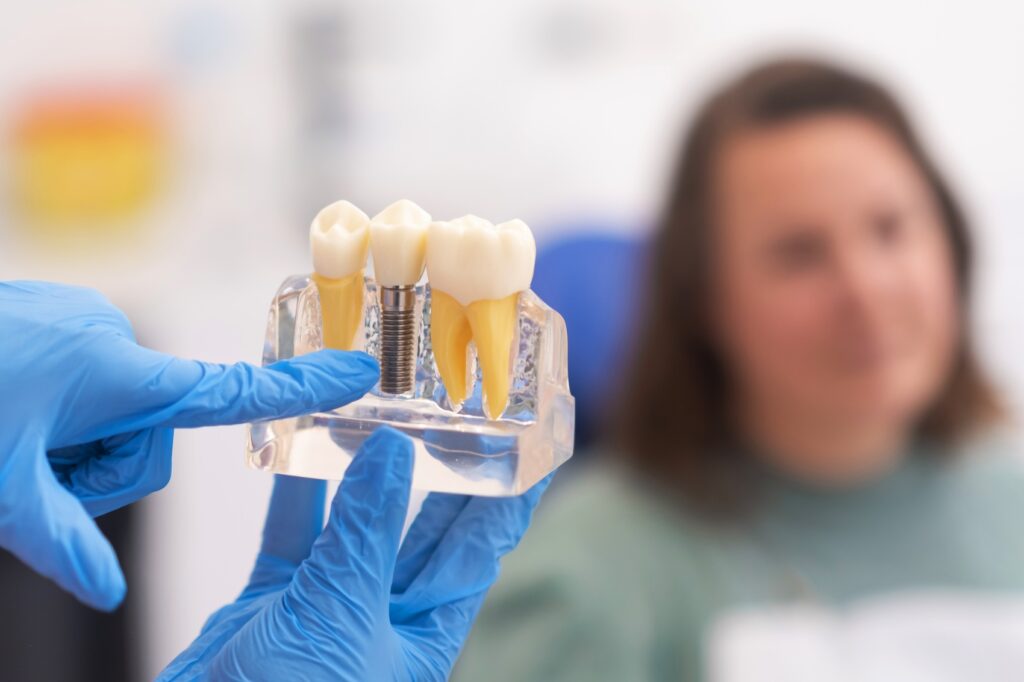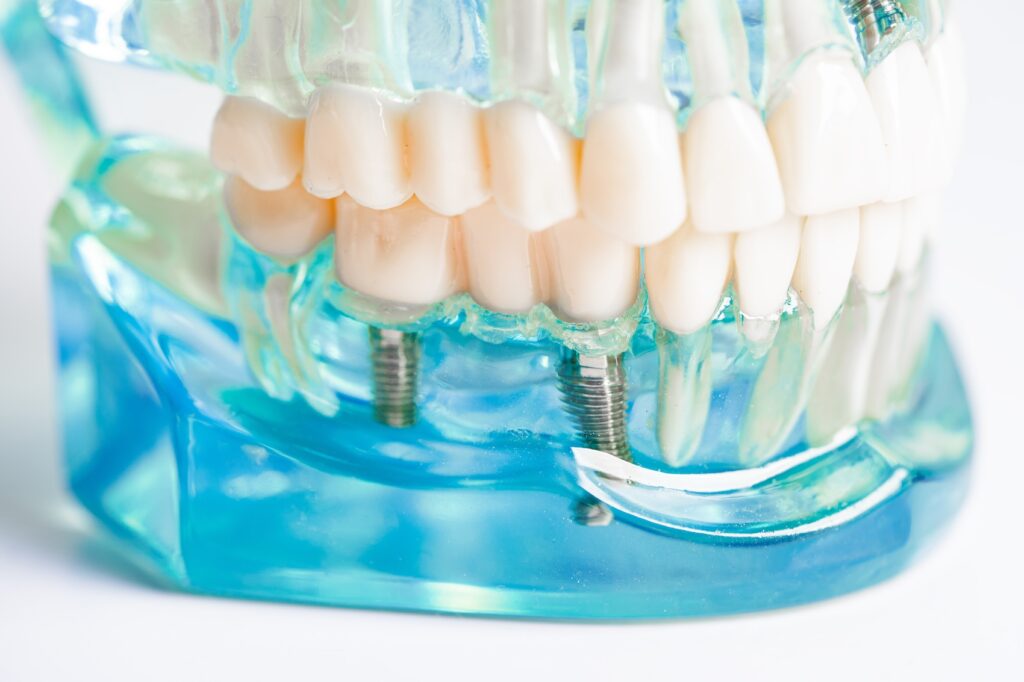
When you have a missing tooth, modern dentistry offers more than one path forward. But how do you know which option is right for you? Two of the most popular solutions for replacing a lost tooth are dental implants and tooth transplants.
While both options aim to restore function and appearance, they differ significantly in process, longevity, and accessibility. At Kleinheinz Dentistry, we believe in helping our patients make informed decisions that fit their oral health goals, lifestyle, and budget.
In this blog, we explore the pros and cons of both treatment options, including procedure details and important considerations like tooth transplant cost in Charlotte, to help you feel confident about your next steps toward a healthier, complete smile.
What is a dental implant?
A dental implant is a prosthetic replacement for a missing tooth. Your natural teeth consist of a crown and a root. The crown is the top portion of the tooth that is visible when we smile, while the root is the hidden portion that extends into the jawbone.
Dental implants are a way to replace the root of a natural tooth with a surgically placed titanium root. This metal implant integrates into the jawbone, which allows your dentist to place an overlying crown on the implanted metal root.
Implants are used to replace a single tooth, several missing adjacent teeth, or to support a removable or fixed denture.
What is the dental implant process?
To decide on the best method of tooth replacement for you, we recommend comparing prices and understanding the treatment process. You should look at the dental implant cost and tooth transplant cost in Charlotte, then read or ask about the procedures, so you know which one works best for you and your schedule.
At Kleinheinz Dentistry, we have over a decade of experience with the dental implant process and are extremely familiar with this popular and safe procedure. Here’s what you can expect when you opt for a dental implant treatment:
- Initial consultation: The first step is a thorough examination at our office, where our team will create a personalized dental implant based on X-rays, 3D imaging, or models of your teeth and jaw.
- Placing the dental implant: Then, your dentist will numb the treatment area and put you under anesthesia so they can place a titanium, screw-shaped implant post into the jawbone. This post heals and will osseointegrate (or fuse) to the jawbone.
- Attaching the abutment: Once the implant has integrated, an abutment is screwed onto the implant. At this time, your dentist will craft a crown that matches your natural teeth.
Fitting the crown: When the crown is ready, your dentist will attach it to the abutment. At this time, we will also re-examine your teeth to ensure the implant has healed and fused properly.
After your procedure, your dentist will provide post-care instructions for you to follow. With excellent home care and routine professional check-ups in the dental office, dental implants are highly durable and can last for decades. If you want to learn more about dental implants, read our blog here.

What is a tooth transplant?
A tooth transplant is a dental procedure where a tooth is moved from one location of the mouth to another. This treatment is usually used to replace one missing or damaged tooth. Typically, the most common donor tooth used in the procedure is a wisdom tooth.
While reimplantation is an interesting concept in the field of dentistry, it is not commonly routinely possible. Typically, it is not a recommended procedure for patients looking to replace a missing tooth.
When considering the tooth transplant cost in Charlotte, taking a closer look at the procedure and risks can help determine if the treatment is the right option for you.
Some risks associated with the procedure include:
- Ankylosis: Ankylosis happens when a tooth becomes stuck to the bone, causing the loss of normal soft tissue like the gums around it.
- External Root Resorption (ERR): Loss of external tooth structure; caused by infection.
- Pulp Necrosis: Dental pulp tissue inside the tooth dies, caused by infection.
- Invasive Cervical Resorption (ICR): The structure of the tooth is slowly destroyed from the outside in.
Discuss your options with a trusted and experienced dentist before determining which method best restores your smile. Never hesitate to schedule an appointment so our team can assess your oral health and help you find the best solutions for your needs.
Schedule an appointment to discuss your options now → Request an Appointment
Tooth Transplants vs. Dental Implants (and Why Dental Implants are Winning)
So, what’s the difference between tooth transplants and dental implants? These two treatments differ when it comes to the procedure, the limitations, the aesthetics, the patient experience, and the long-term effects. These differences help determine the dental implant and tooth transplant cost in Charlotte, and which solution is right for you.
The Procedure
The primary difference between tooth transplants and dental implants is whether a patient’s tooth is used for the replacement process or if a custom-crafted crown is used. Often, patients do not have teeth to spare and use in a transplant procedure.
More often than not, a dental implant is likely to be a better solution for replacing a missing tooth or teeth. It is a straightforward procedure with a high success rate and minimal risks of complications.
The Limitations
Both tooth transplants and dental implants have some procedural limitations. The number one limitation for dental implants is the jaw’s bone density. There must be enough bone in the implant site for dental implants to be securely inserted into the jaw and fuse properly.
In some cases, bone grafting resolves this issue, but these procedures have to be done before the implant process can begin.
The biggest limitation of tooth transplantation is that it is not a routine procedure that is often recommended to patients. There are many risks involved, and the process for taking a healthy tooth and transplanting it somewhere else in the mouth is often not the best course of action.
Never hesitate to reach out to our team to learn more about your options for replacing missing teeth. We are always happy to answer your questions and help you find the best treatment option for you and your needs.
Contact us now to find the answers to your questions → Contact Us

The Aesthetics
When our smiles look great, it’s easier to feel great. Dental implants offer a crown that is nearly identical to the natural teeth in the mouth. Dentists craft the crown to be indistinguishable from surrounding teeth; it will look, feel, and function exactly like a natural tooth.
The location of the lost tooth and the replacement tooth determine the aesthetics of a tooth transplant. If a transplant procedure is possible at all, the procedure usually uses wisdom teeth. If the lost tooth is in the front of the mouth, the resulting transplant with a wisdom tooth will look unattractive and unnatural.
The Patient Experience
Though both procedures share some similarities, the overall patient experience will differ slightly for each. Both require some amount of surgery, so patients should expect a procedure using anesthesia.
The After-care
Post-treatment care for dental implants and tooth transplants is where they differ. Caring for your dental implant is relatively easy, and you can maintain the crowns just like your natural teeth. They do not pose a risk of decay, since they are artificial crowns, which is a bonus.
After a tooth transplant, the transplanted tooth can still be prone to decay and rot. Poor oral hygiene can lead to the loss, which puts one at risk of having a missing tooth.
The Long-Term Effects
Usually, if you’re considering dental implants or tooth transplants, you’re looking for a near-permanent solution for a missing tooth (or teeth). Tooth transplants can last a long time if the tooth successfully adjusts to its new placement.
However, there is a risk of rejection after a tooth transplant. If this happens, the tooth used in the procedure will need to be replaced. This can present some problems, especially if you have no donor teeth left for the procedure or your wisdom teeth are too developed for the transplant. This is one of the core reasons this procedure is often not recommended.
Dental implants can last for decades with proper care and normal dental upkeep. If the crown ever needs to be replaced, a new one is simply made and placed onto the dental implant like before, no surgery required.
The longevity of dental implants often makes the treatment more cost-effective in the long run when compared to the tooth transplant cost in Charlotte.
Explore Your Tooth Replacement Options With Us
Choosing between the treatments shouldn’t be a cookie-cutter decision; it should be about finding a solution that best supports your oral health, lifestyle, and long-term goals.
At Kleinheinz Dentistry, we’re committed to helping you understand all your options so you can make an informed decision that supports your health, comfort, and confidence. If you’re exploring tooth replacement solutions and tooth transplant cost in Charlotte, our team is here to guide you every step of the way with personalized care and expert insight.
Ready to take the next step? Book an appointment with Dr. Kleinheinz. He and his team are here to help you smile with confidence again. If you’re experiencing other dental issues, but aren’t sure where to start, check out our blogs on a dental bridge for teeth and tooth decay removal.


